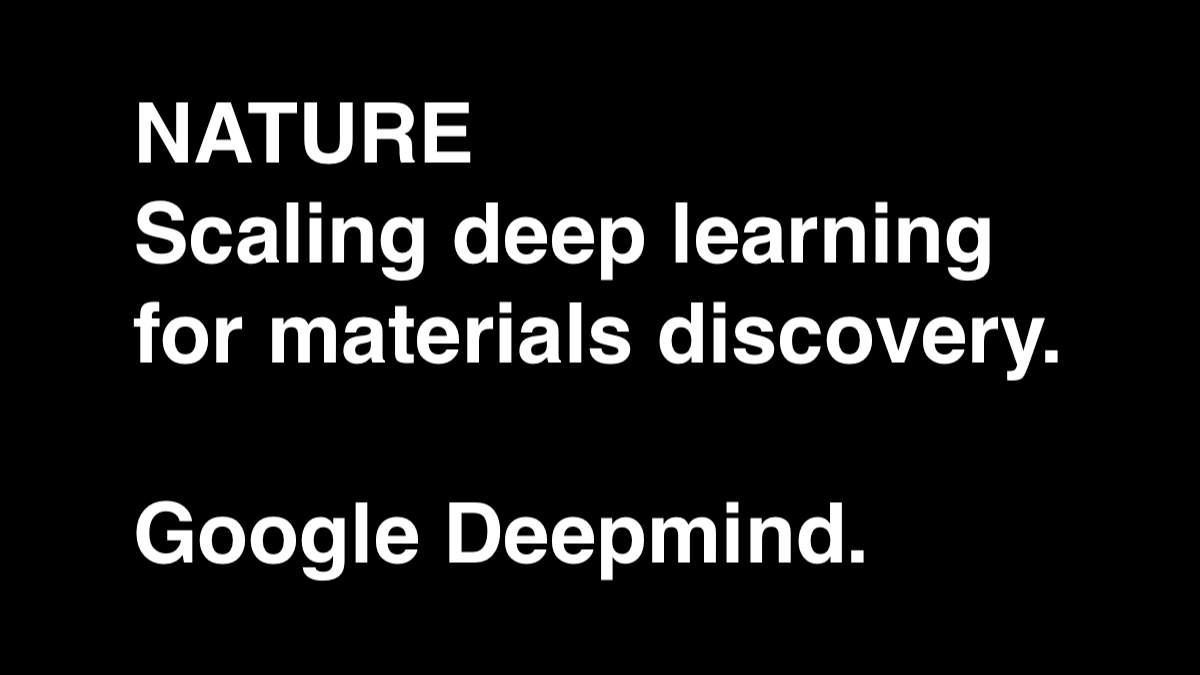A very good read from a respected source!
NATURE. Scaling deep learning for materials discovery
Nature (2023)
Abstract
Novel functional materials enable fundamental breakthroughs across technological applications from clean energy to information processing1,2,3,4,5,6,7,8,9,10,11. From microchips to batteries and photovoltaics, discovery of inorganic crystals has been bottlenecked by expensive trial-and-error approaches. Concurrently, deep-learning models for language, vision and biology have showcased emergent predictive capabilities with increasing data and computation12,13,14. Here we show that graph networks trained at scale can reach unprecedented levels of generalization, improving the efficiency of materials discovery by an order of magnitude. Building on 48,000 stable crystals identified in continuing studies15,16,17, improved efficiency enables the discovery of 2.2 million structures below the current convex hull, many of which escaped previous human chemical intuition. Our work represents an order-of-magnitude expansion in stable materials known to humanity. Stable discoveries that are on the final convex hull will be made available to screen for technological applications, as we demonstrate for layered materials and solid-electrolyte candidates. Of the stable structures, 736 have already been independently experimentally realized. The scale and diversity of hundreds of millions of first-principles calculations also unlock modelling capabilities for downstream applications, leading in particular to highly accurate and robust learned interatomic potentials that can be used in condensed-phase molecular-dynamics simulations and high-fidelity zero-shot prediction of ionic conductivity.
Learn More: Materials Discovery: GNoME
- Google DeepMind AI reveals potential for thousands of new materials – Reuters
- Deepmind AI tool catapults materials science 800 years into the future – New Atlas
- Prepare for a radical acceleration in technological development. A Google Deepmind AI has achieved “an order-of-magnitude expansion in stable materials known to humanity,” finding about 800 years’ worth of new materials with revolutionary potential. The discovery of new materials with unusual properties can start technological snowballs rolling that eventually push society in new directions – but up to this point, it’s been a painstakingly slow process involving a lot of trial-and-error experimentation.
- Chemistry Crystal-hunting DeepMind AI could help discover new wonder materials – New Scientist
- We know of around 48,000 inorganic crystal structures, which provide materials with a range of properties. Now, an AI created by Google DeepMind has predicted over 2 million more possibilities
- An artificial intelligence created by Google DeepMind may help revolutionise materials science, providing new ways to make better batteries, solar panels, computer chips and many more vital technologies.
- “Anytime somebody wants to improve their technology, it inevitably includes improving the materials,” says Ekin Dogus Cubuk at DeepMind. “We just wanted them to have more options.”
- The AI model, called Graph Networks for Materials Exploration, or GNoME, is designed to predict inorganic crystal structures, which are repeating arrangements of atoms that provide materials with particular properties – for example, the six-fold symmetry of a snowflake is a result of the crystal structure of ice.
- Google DeepMind researchers use AI tool to find 2mn new materials. – FT
- Work shows power of AI to improve real-world technology in fields from renewable energy to advanced computation
- Google DeepMind researchers have discovered 2.2mn crystal structures that open potential progress in fields from renewable energy to advanced computation, and show the power of artificial intelligence to discover novel materials. The trove of theoretically stable but experimentally unrealised combinations identified using an AI tool known as GNoME is more than 45 times larger than the number of such substances unearthed in the history of science, according to a paper published in Nature on Wednesday. The researchers plan to make 381,000 of the most promising structures available to fellow scientists to make and test their viability in fields from solar cells to superconductors. The venture underscores how harnessing AI can shortcut years of experimental graft — and potentially deliver improved products and processes.
- INDEPENDENT. DeepMind’s AI discovers ‘800 years’ worth of knowledge’
- ‘We’ve multiplied the number of technologically viable materials known to humanity,’ company says
- Google’s leading AI division DeepMind claims to have unlocked “800 years’ worth of knowledge” after discovering 2.2 million new crystals.
- The materials found through the research could be used to transform industries, DeepMind said, while simultaneously opening up brand new avenues for making future discoveries.
- Of the 2.2 million crystals, roughly 380,000 of them are reportedly stable enough for developing next-generation technologies, ranging from better electric car batteries to superconductors for ultra-efficient computers.
- In order to discover the crystals, DeepMind developed a state-of-the-art neural network tool called GNoME (Graph Networks for Materials Exploration).
- DeepMind researchers Amil Merchant and Ekin Dogus Cubuk wrote in a blog post that using GNoME bypassed centuries of “painstaking experimentation” that would have been required to discover the new materials.
- “With GNoME, we’ve multiplied the number of technologically viable materials known to humanity,” the researchers wrote.
- “GNoME shows the potential of using AI to discover and develop new materials at scale… We hope that GNoME and other AI tools can help revolutionise materials discovery today and shape the future of the field.”
- External researchers tested DeepMind’s breakthrough by independently creating 736 of the new materials discovered by GNoME.
- “Among these candidates are materials that have the potential to develop future transformative technologies ranging from superconductors, powering supercomputers, and next-generation batteries to boost the efficiency of electric vehicles,” the blog post stated.
- The research was detailed in a study, titled ‘Scaling deep learning for materials discovery, published in the journal Nature.
- The researchers behind the new tool said it can “reach unprecedented levels of generalisation, improving the efficiency of materials discovery by an order of magnitude”.
- Others uninvolved in the research described GNoME as the “ChatGPT for chemistry”, referring to the hugely popular artificial intelligencechatbot released exactly one year ago.
- “Scientific discovery is the next frontier for AI,” said Carla Gomes, co-director of the Cornell University AI for Science Institute, who was not involved in the research. “That’s why I find this so exciting.”


